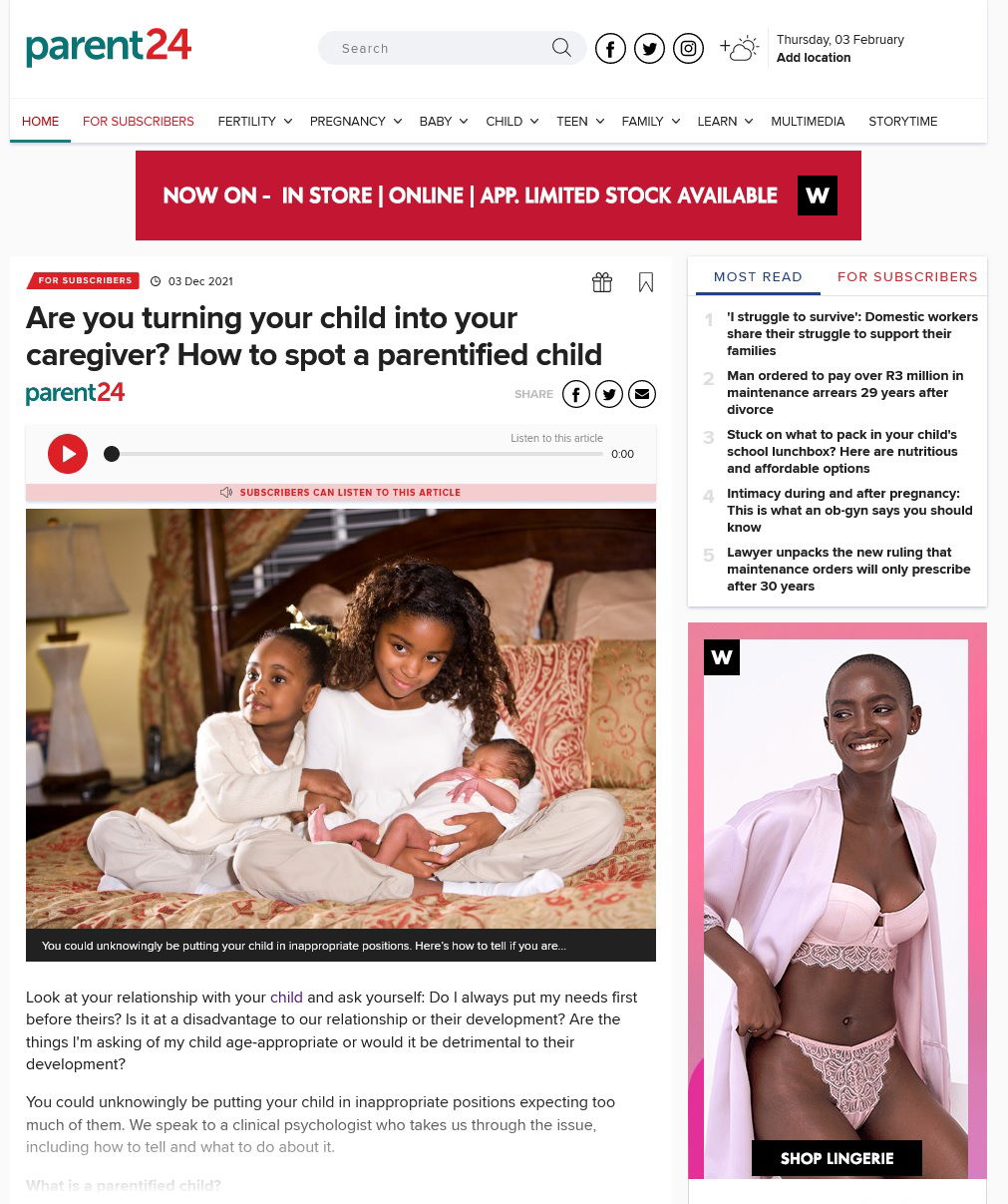Are you turning your child into your caregiver? Ways to spot a parentified child


BY: Carmen Williams
You could unknowingly be putting your child in inappropriate positions. Here’s how to tell and what to do about it. What is a parentified child? “Parentification is basically a role reversal that happens. It’s usually when you have a child who has to act either as an emotional support or take on a role that their parent would normally take on. So, for instance, they either have to act as a parent to their own parent or have to parent to their siblings. It could be physical things like cooking cleaning and childcare, or it could be filling an emotional need in their parent like a pseudo partnership,” says Roxanne James, a clinical psychologist from Cape Town. There are low levels of parentification that can be beneficial to your child’s development, but when the child starts taking on roles that are far more adult or being an inappropriate emotional support, it can be an abusive situation. “…it very much depends on who gains from the child taking on those roles,” says James. “If the form of parentification is that you have to watch your younger siblings, there’s a difference between ‘I’m going to take a shower, keep an eye out’ and that parent expecting their child to take on full childcare responsibilities of a younger sibling. This is neglecting the needs of the younger sibling as well as the need of the child who is being asked to do this. At its extreme end, it can be a form of emotional abuse as it’s about the parent’s needs superseding the needs of the child and their emotions being pushed away for the sake of the parents.” Parentified children often learn to push their own needs aside in order to take care of their parent/guardian’s emotional needs instead. Says James: “Sometimes there can be positives like increased empathy or emotional intelligence, but it’s at the cost of a normal childhood.” Could I be parentifying my child? What signs to look out for Look at your relationship with your child and ask yourself do I always put my needs first before theirs, is it at a disadvantage to our relationship/their development? Are the things I’m asking of my child age appropriate or would it be detrimental to their development? “There is a continuum of appropriate behaviour when parenting, but I think the central question is ‘when I have an expectation of my child, do I have that expectation because of my needs or is it something that would help with the appropriate development of my child?’ Are you expecting them to help do the dishes, or take on the responsibility that an adult is supposed to have? Are you unloading on them emotionally in a way that is inappropriate?” advises James. James makes an example of if you were late to fetch your child from school for various reasons like a work conflict or something else, and your child is now in a state if distress from having to wait for you, when they get in the car, do you flood them with ‘oh my day has been so terrible, I’ve had to deal with…’? Do you put your needs first or do you give them the space to feel their own anxiety so they can express themselves appropriately and learn to manage their own emotions? What do parentified children look like as adults? Adults who were parentified as children are more likely to develop psychiatric disorders as adults. James says these adults often become “…someone who engages in relationships where their needs are put second and the needs of their partners are first because that is the only way they know how to engage.” There’s also the increased levels of anxiety and stress as well as a predisposition to depression as these adults were not able to follow proper emotional development. James says there’s lots of shame and guilt in these individuals and they feel an increased sense of responsibility. “If something goes wrong, they take it on. It could manifest as someone in the workplace who takes on all the projects and doesn’t put boundaries in place when needed. Suppressing of their own wants and needs in favour of someone else. Perhaps even trying to perform towards what others expect them to do. Taking on a certain career, role or profession because they were expected to do so,” she says. How do you speak to a friend/family member who may be doing this to their child? James says it’s tricky as people are sensitive about their parenting techniques and about being judged, but the best option is “…to sit down with that person and not use terms like ‘you are wrong when you do this’, but more ‘when you do this, it seems like your son responds in this way’ or ‘don’t you think it’s not appropriate for child x to be expected to do this’. It’s a very difficult discussion to have because the parentification is a symptom of something larger,” says James. Adults who were parentified as children often repeat this cycle as they don’t realise how bad this behaviour was and carry on the cycle of trauma and abuse. How can parents fix this situation? Therapy. “If you’re engaging in a cycle of parentification, it’s important to identify and acknowledge your areas of difficulty so that you don’t enact them on someone else. If you work on those issues, you maybe no longer feel the need to dump them on your own child. If you’re a parentified child or an adult who was parentified, it’s sometimes just important to acknowledge how wrong what you went through was. You can’t change the past, but you can grow and heal from it,” says James.